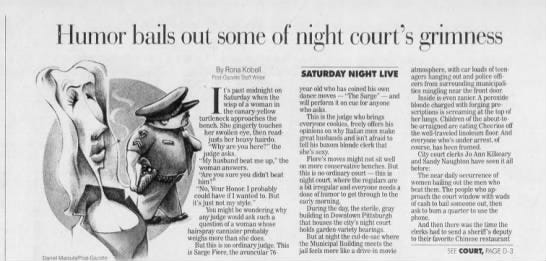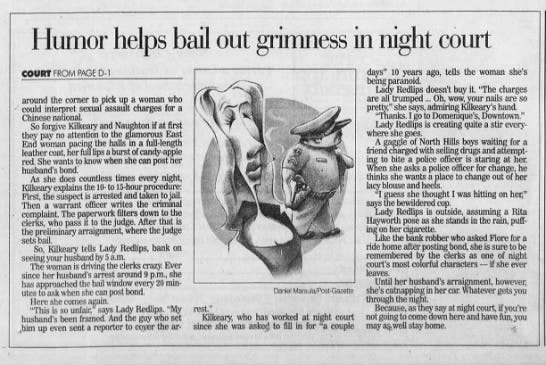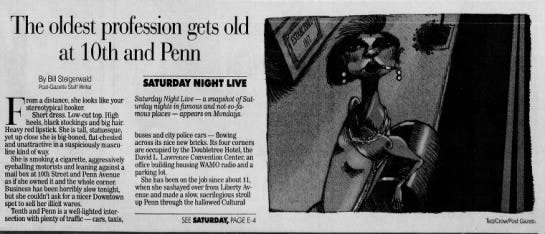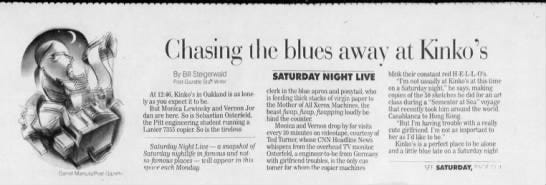'Saturday Night Live,' Post-Gazette-style
A talented young reporter named Rona Kobell wrote a brilliant piece for a weekly series I invented/edited in 1999 that captured the zany scene she saw at a session of Pittsburgh's night court.
For several months in 1999 at the Pittsburgh Post-Gazette I was the editor of a series called ‘Saturday Night Live’ that appeared every Monday at the top of the front page of the Magazine section.
The series was billed as “a snapshot of Saturday niqhtlife in famous and not-so famous places.”
The idea was for the best PG writers — and there were a couple dozen of them — to go somewhere specific on a late Saturday night, hang out, observe and write an artful, first-person piece of journalism that would appear nine days later.
Rona Kobell, a Pittsburgh native, was an intern, I think, and her colorful, funny and semi-poignant piece describing what she saw at night court fulfilled the series’ mandate to perfection.
Other articles, which always included one of Dan Marsula’s great illustrations, included Gene Collier’s adventure in a karaoke bar, a late-night visit to a Walmart and what I saw the early morning I hung around with the transvestites on Penn Avenue in downtown Pittsburgh (see below).
I stopped doing the ‘SNL’ series after a senior editor told me she didn’t like it, which is one of many stupidities that I consider was an early sign that newspapers were in their death throes and deserved to die.
— Bill Steigerwald
Humor bails out some of night court's grimness
By Rona Kobell
It’s past midnight on Saturday night when a wisp of a woman in a canary-yellow turtleneck approaches the bench. She gingerly touches her swollen eye, then readjusts her heavy hairdo.
"My husband beat me up," the woman answers.
“Are you sure you didn’t beat him?” the judge asks.
"No, Your Honor. I probably could have if l wanted to. But it's just not my style."
You might be wondering why any judge would ask such a question of a woman whose hairspray cannister probably weighs more than she does.
But this is no ordinary judge. This is Sarge Fiore, the avuncular 76-year-old who has coined his own dance moves "The Sarge" and will perform it on cue for anyone who asks.
This is the judge who brings everyone cookies, freely offers his opinions on why Italian men make great husbands and isn't afraid to tell his buxom blonde clerk that she's sexy.
Fiore's' moves might not sit well on more conservative benches. But this is no ordinary court this is night court, where the regulars are a bit irregular and everyone needs a dose of humor to get through to the early morning.
During the day, the sterile, gray building in Downtown Pittsburgh that houses the city's night court holds garden-variety hearings.
But at night the cul-de-sac where the Municipal Building meets the jail feels more like a drive-in movie atmosphere, with car loads of teenagers hanging out and police officers from surrounding municipalities mingling near the front door.
Inside is even zanier. A peroxide blonde charged with forging prescriptions is screaming at the top of her lungs. Children of the about-to-be-arraigned are eating Cheerios off the well-traveled linoleum floor. And everyone who's under arrest, of course, has been framed.
City court clerks Jo Ann Kilkeary and Sandy Naughton have seen it all before: The near daily occurrence of women bailing out the men who beat them. The people who approach the court window with wads of cash to bail someone out, then ask to bum a quarter to use the phone.
And then there was the time the clerks had to send a sheriff's deputy to their favorite Chinese restaurant around the corner to pick up a woman who could interpret sexual assault charges for a Chinese national.
So forgive Kilkeary and Naughton if at first they pay no attention to the glamorous East End woman pacing the halls in a full-length leather coat, her full lips a burst of candy-apple red. She wants to know when she can post her husband's bond.
As she does countless times every night, Kilkeary explains the 10- to 15-hour procedure:
First, the suspect is arrested and taken to jail. Then a warrant officer writes the criminal complaint. The paperwork filters down to the clerks, who pass it to the judge. After that is the preliminary arraignment where the judge sets bail.
So, Kilkeary tells Lady Redlips, bank on seeing your husband by 5 a.m.
The woman is driving the clerks crazy. Ever since her husband's arrest around 9 p.m., she has approached the bail window every 20 minutes to ask when she can post bond. Here she comes again.
"This is so unfair," says Lady Redlips. "My husband's been framed. And the guy who set him up even sent a reporter to cover the arrest."
Kilkeary, who has worked at night court since she was asked to fill in for "a couple days" 10 years ago, tells the woman she's being paranoid. Lady Redlips doesn't buy it.
"The charges are all trumped ... Oh, wow, your nails are so pretty," she says, admiring Kilkeary's hand.
"Thanks. I go to Domenique's, Downtown."
Lady Redlips is creating quite a stir everywhere she goes.
A gaggle of North Hills boys waiting for a friend charged with selling drugs and attempting to bite a police officer is staring at her. When she asks a police officer for change, he thinks she wants a place to change out of her lacy blouse and heels.
"I guess she thought I was hitting on her," says the bewildered cop.
Lady Redlips is outside, assuming a Rita Hayworth pose as she stands in the rain, puffing on her cigarette.
Like the bank robber who asked Flore for a ride home after posting bond, she is sure to be remembered by the clerks as one of night court's most colorful characters — if she ever leaves.
Until her husband's arraignment, however, she's catnapping in her car. Whatever gets you through the night.
Because, as they say at night court, if you're not going to come down here and have fun, you may as well stay home.
Rona Kobell, whose husband Jesse Walker is Reason magazine’s book editor, wrote many other features and news stories for the PG before moving to the Baltimore Sun and bailing out of the daily newspaper trade. She is the cofounder of the Environmental Justice Journalism Initiative. She teaches at the University of Maryland’s Philip Merrill College of Journalism.
*****
The oldest profession gets old at 10th and Penn
By Bill Steigerwald
May 31, 1999
Saturday Night Live -- a snapshot of Saturday nights infamous and not-so-famous places -- appears on Mondays.
From a distance, she looks like your stereotypical hooker.
Short dress. Low-cut top. High heels, black stockings and big hair. Heavy red lipstick. She is tall, statuesque, yet up close she is big-boned, flat-chested and unattractive in a suspiciously masculine kind of way.
She is smoking a cigarette, aggressively eyeballing motorists and leaning against a mail box at 10th Street and Penn Avenue as if she owned it and the whole corner. Business has been horribly slow tonight, but she couldn't ask for a nicer Downtown spot to sell her illicit wares.
Tenth and Penn is a well-lighted intersection with plenty of traffic cars, taxis buses and city police cars flowing across its nice new bricks. Its four corners are occupied by the Doubletree Hotel, the David L. Lawrence Convention Center, an office building housing WAMO radio and a parking lot.
She has been on the job since about 11, when she sashayed over from Liberty Avenue and made a slow, sacrilegious stroll up Penn through the hallowed Cultural
District, which was obviously not gentrified with fake gaslights and posted with brass historical markers to meet the needs of her venerable profession.
Well after midnight, as wet, warm steam swirls from sidewalk manhole covers, she paces nervously at the corner diagonally across from the Doubletree.
She poses at the granite curb with a cigarette dangling from her mouth, a hand on her hip and a thin leg jacked up on a low wall.
She makes eye-contact with each potential customer who walks by, sometimes giving the extra-curious a guarded little wave and once asking in a tender voice, "You don't want no company?"
After a while she takes a break and talks to a less-than-dapper, high-strung young man in a blue and white athletic jersey. He has been lurking about for hours. Earlier he was slumped behind the wheel of an old white Nissan parked on Penn.
Is he her friend? Her lookout? Her pimp? Maybe all three. In more than two hours, 10th-and-Penn's only working hooker has had no hassles from passing city cop cars, no competition and no customers.
On this damp, cool Saturday night, her corner is not living up to its hot reputation. Where are all the other prostitutes tonight, she is asked? In jail, she says sharply in a husky voice before launching into a perfectly lucid but triple-X-rated rant that would get her kicked off Jerry Springer's show.
First she makes a philosophical point on behalf of all sex professionals through the ages: She ought to be free to sell, lease or time-share her body to whomever she wants without being arrested.
Next she asks a couple of rhetorical, public policy questions that would be perfect for one of Lynn Cullen’s radio talk shows.
Do taxpayers really want to pay police officers $40,000 a year to chase prostitutes? Why should the cops or anyone else care whom she drives away with or what she does when she's with them?
Casually referring to herself as "a known prostitute," she says she's been arrested many times. She's worried about the two squad cars that have been parked behind 927 Penn on French Street for the past hour or two, but most cops don't bother with her profession.
"I'd like to chat," she says in a friendly way as she moves closer to the curb. "But I got to make some money."
It's now 2 a.m. Everywhere bars are emptying. Traffic coming from the Strip District is picking up. The two city cop cars are gone. The doorways and alleys on Penn are quiet and dark and seemingly safe.
Tenth and Penn is just one of several spots in and around Downtown where streetwalkers of all colors and sexual persuasions are regularly found after midnight.
Even at its busiest, no one could ever mistake it for Hamburg's infamous Reeperbahn or one of Hollywood's thriving corner sex markets.
But suddenly, several other prostitutes appear on Penn. One is older, heavy-set and stays in the shadows.
The second is young, smiley and sweet looking. She's decked out in a Players cap, running shoes, several gold bracelets and matching Tampa Bay Buccaneer jacket and shorts.
Within minutes, she is jumping into the front seat of a Toyota pickup truck that has popped out of one of Penn's alleywavs.
She, like all the prostitutes observed working this Saturday night, is black. But a sergeant with the city's vice unit said white women are arrested at 10th and Penn all the time.
And for the record, the sergeant said, the flamboyantly dressed prostitutes are almost guaranteed to be men in drag, and the going rate for most sexual acts is about $20.
A third prostitute proves that after thousands of years of practice, selling sex on the street for money as well as buying it is still an ugly, degrading and potentially dangerous activity.
Wearing a long red-orange plastic skirt with a big split up one leg and a matching top, she is no happy hooker.
Mean, agitated and nasty looking -- predatory almost -- she is obviously drunk or strung-out on something. She struts, prances and twirls on the sidewalk. She struggles out of her plastic jacket, revealing bare shoulders and a bra-like top.
She hops up on top of a city trash receptacle at the bus stop for a few minutes. Like a gargoyle of the evening, she beckons to passing cars with her index finger, then hops back down.
A man with long hair, glasses and a premature beer gut suddenly appears on the sidewalk and says something to her. She extends the back of her hand awkwardly, drunkenly, in the direction of his crotch. He steps back. She does it again. He backs off and walks away.
A minute later, she staggers down the sidewalk, gets into his car and they ride off into the night. At 10th and Penn, it's just business as usual.
Illustration by Ted Crow
******
‘Saturday Night Live’ — Chasing the blues away at Kinko's
By Bill Steigerwald
At 12:40, Kinko's in Oakland is as lonely as you expect it to be.
But Monica Lewinsky and Vernon Jordan are here.
So is Sebastian Osterfeld, the Pitt engineering student running a Lanier 7355 copier.
So is the tireless clerk in the blue apron and ponytail, who is feeding thick stacks of virgin paper to the Mother of All Xerox Machines, the beast fwap, fwap, fwapping loudly behind the counter.
Monica and Vernon drop by for visits every 30 minutes on videotape, courtesy of Ted Turner, whose CNN Headline News whispers from the overhead TV monitor.
Osterfeld, a engineer-to-be from Germany with girlfriend troubles, is the only customer for whom the copier machines blink their constant red “H-E-L-L-O's.”
"I'm not usually at Kinko's at this time on a Saturday night," he says, making copies of the 50 sketches he did for an art class during a "Semester at Sea" voyage that recently took him around the world, Casablanca to Hong Kong.
"But I'm having trouble with a really cute girlfriend. I'm not as important to her as I'd like to be."
With its Power Macintosh 7300180 computers for rent, free office supplies and plenty of work space, Kinko’s is a sale haven from the squads of carefree college kids rushing past its front door in various states of inebriation.
The 24-hour copy place at 3710 Forbes Ave. like Kinko's worldwide is heavy on the Formica. But it has all your office needs and all the free rubber bands you can shoot. There are even jars of complimentary hard candy for the sucking.
It's a friendly, customer-trusting hangout for the officeless or the college student with acts of copyright infringement on his or her mind.
Not that copyright infringement is why Summer Clapper has come to Kinko's at 1:05.
The Pitt senior, majoring in social work, admits studying on a Saturday night is not something to be proud of. But she's sharing an "Abnormal Psychology" textbook with a friend, and she needs to photocopy diagrams of things like "The Diseased Brain" for a test.
Clapper is a fairly typical of the "night people" he sees, says the clerk, who is too busy punching buttons and tending to the insatiable needs of the Mother of All Xeroxes to talk for more than 20 seconds at a time.
At this time of year, late-night guests might be students, people making copies of church bulletins or the regular customers who actually use Kinko's for what it was invented for.
Other familiar faces come in and just watch TV — Kinko's offers full cable. Or they ask him to trade dollar bills for the coins they have panhandled.
However, as the talking heads of Monica and Vernon come around and around again on CNN, none of these colorful types shows up to avail themselves of Kinko's unique social services.
But the screen of an IBM 300 GL provides evidence that one of Kinko's more non-traditional customers, Marcel Means, had dropped by earlier to do some very important work.
At 11:30 Means had signed up to rent a computer for $12 an hour. Now, at 1:50 a.m., the screen of the IBM 300 GL he used still contains the carefully typed, if not perfectly spelled, prayer he wrote in 18-point font.
It begins like this:
Hear these praises
From a greatful heart
Each time I think of you
The praises start
Love you so much Jesus
Love you so much
Means is long gone. Whether he left his prayer on the computer screen by accident or deliberately, no one will ever know.
But the computer says his bill for 135 total minutes of computer time and four printouts is $29.20, and still counting.
At 2 a.m., as the Mother of All Xeroxes chugs along tirelessly, the clerk with the ponytail is too busy to notice that his store is completely empty again.
Once again the Lanier 7355 copiers flash their friendly “H-E-L-L-O’s” to no one, and the only human voice that can be heard is Monica Lewinsky's.






